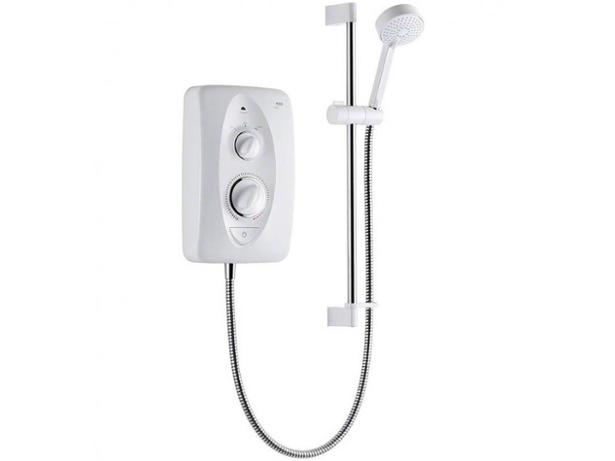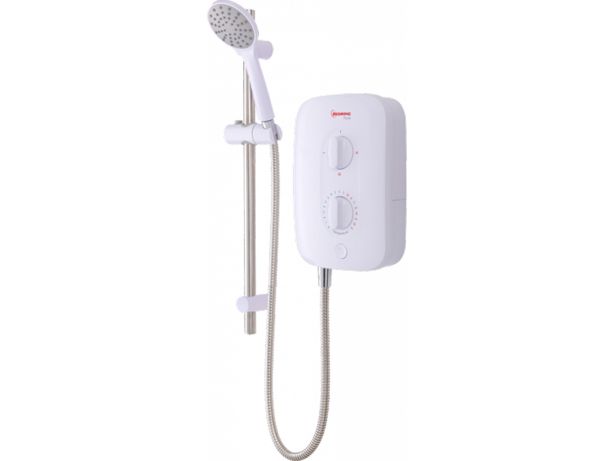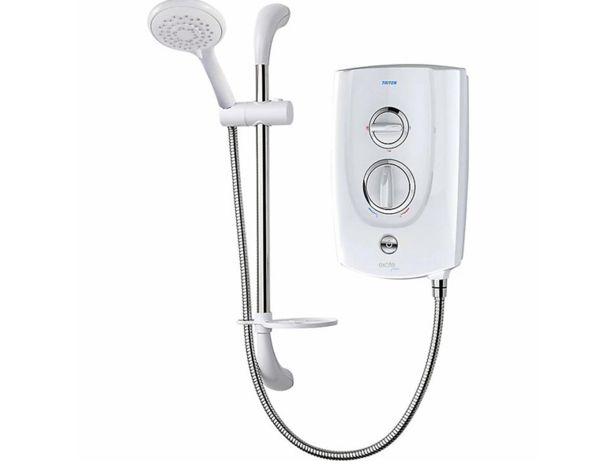How to get an electric shower installed

Electric showers combine water and electricity, so it’s vital that they're installed correctly and safely.
It might be tempting to save on cost and rewire or replace an old electric shower yourself, but this can pose serious risk for an unqualified person, and likely result in you having to call out for a professional anyway. Hiring a reputable and trusted electrician is the safest way to ensure your unit is wired and secured as it should be.
If you’re replacing an old electric shower or installing a new one from scratch, it's best to get it installed by a Part P-certified plumber or ideally an electrician, who will be able to install, upgrade or check the wiring to ensure that the shower works safely.
Find out what else you need to know if you're putting in a new electric shower.
Discover which electric shower brands are highly rated by owners
Is it worth getting an electric shower?
Deciding whether an electric shower is right for you will depend on your home heating set up.
While mixer showers retrieve hot water from a boiler or tank, an electric shower needs only a cold water supply, which it will then heat much like a kettle with an electrical heating element.
There are several reasons why you might want to consider an electric shower for your home:
- You don't have a boiler or central heating system
- You want your shower to produce hot water instantly
- You want the shower to remain functional if your boiler fails.

But bear in mind that electric showers, especially those with lower wattage, will usually run at a lower water pressure than a mixer shower. This can be remedied with a shower pump, which is something you can speak to your plumber about.
And, while they will keep working if your boiler fails, they won't turn on in the event of a power cut.
Electric shower running costs
The general running costs for your electric shower will largely depend on its wattage, the price of your electricity tariff and how it's being used.
The wattage for electric showers can vary based on which model you get, but it can range between 7.5kW and 10.8kW. Higher-wattage electric showers will provide better flow and pressure, but will be more expensive to run.
Read this guide to find out more about the running costs of electric showers.

Can anyone fit an electric shower?
While technically anyone could install an electric shower, this doesn't mean just anyone should.
If you're not a qualified electrician, trying to wire up an electric shower could result in serious injury, damage to your bathroom and an expensive bill if you have to get it professionally fixed.
Having an electric shower professionally installed makes up a big part of the overall cost of getting a new shower. Even a straightforward installation, where the cold water supply is easily accessible and the route from the shower to the shower unit (main electrical supply) is simple, can cost more than the shower itself.
While either a plumber or electrician can install the plumbing side, you must get a Part P-certified electrician to wire, test and sign off on the electrics.

Part P is primarily an electrical qualification, which certifies the installer to safely and securely design and install various electric circuits. In short, it means that the person fitting your electric shower can do so in a safe and legal way.
To find Part P-certified traders, you can search for reliable plumbers and electricians near you with Which? Trusted Traders. You can also use our Trusted Traders search tool.
If you're not sure which shower to buy, head to our guide on how to buy the best shower.
Finding a trustworthy electric shower installer
The easiest option is to choose an installer who is a member of a self-certification scheme such as those listed below. You can get more details of these competent-person schemes from your local council’s Building Control.
- BRE Certification
- British Standards Institution
- ELECSA
- NAPIT Certification
- NICEIC Certification Services
You can also use Which? Trusted Traders to find an endorsed plumber or electrician in in your area.
Before the installer begins work, agree with them that they will take responsibility for ensuring the installation complies with the building regulations and will provide the BS7671 certificate. You will need to produce this if you want to sell your home to prove that electrical work has been carried out safely.






















